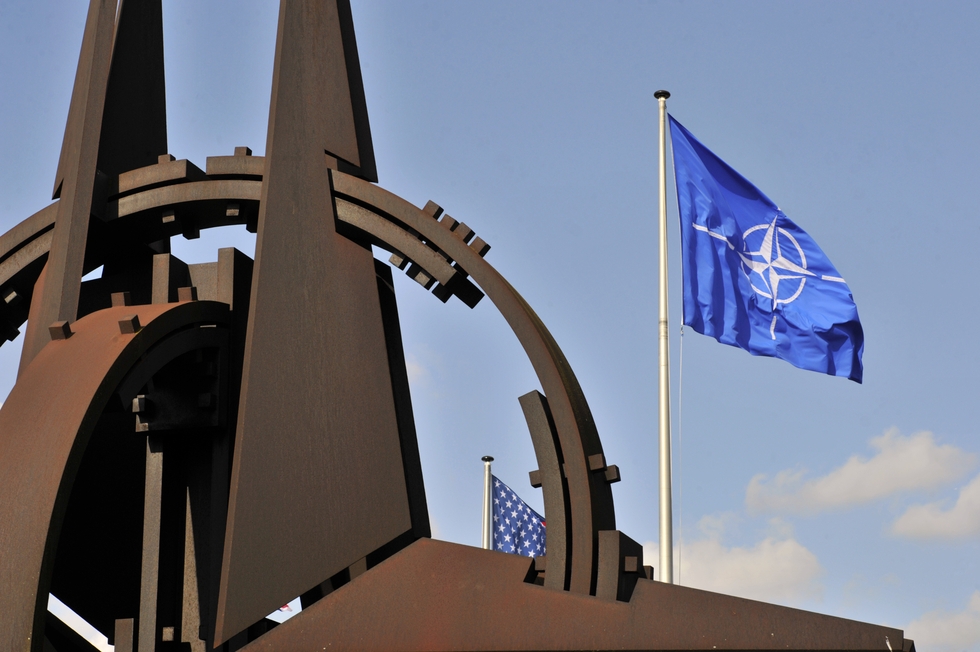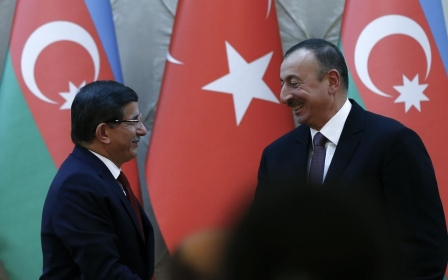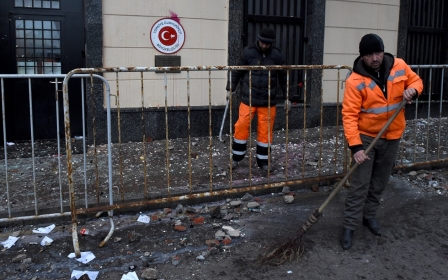Widening gap between NATO's deeds and discourse on Syria

The Turkish–Russian row can’t be just reduced to a bilateral feud. Turkey is a NATO member and Turkish airspace is NATO airspace. When Russia repeatedly violated the Turkish airspace, it knew full well that it was also violating NATO’s airspace.
The recent history of the Russia’s violations of NATO’s air and sea space refutes the United States’ initial attempt to frame the dispute in bilateral terms. To be precise, a London-based think-tank, The European Leadership Network, has documented 39 violations of NATO air and sea space by Russia since March 2014.
Given the scale of the violations, it is clear that they aren’t taking place accidentally. Instead, Russia seems to be testing Western defences and NATO’s resolve in defending its members’ sea, air and territorial sovereignty, for barring the recent shooting down of the Russian jet, Russia got away with all its previous violations without being confronted in any serious way.
In this respect, this recent crisis is likely to be seen as a litmus test of the NATO’s coherence and resoluteness in facing unjustified aggression of this kind.
Besides defence and security, Russia’s actions are also the result of its aversion to a political model, the insipient waves of participatory political system which it fears is threatening its traditional geopolitics of influence. This is undeniably the case in Syria. In this regard, the course of action that NATO and the West take in Syria in the aftermath of the Russia’s heavy military build-up will reveal the nature of the political underpinnings of NATO and the West’s security paradigm.
After the Cold War, NATO should have realised that a new contest of models is ongoing. And Syria is a battlefield on which this contest is forcefully playing itself out. Unlike the Cold War, during which the contest of models were more economic in nature - taking place along free-market capitalism versus command economy lines, the new contest has its roots more in political philosophy than in the governance of the economy.
One question is particularly pertinent here, for all actors in the Syrian crisis express their support for the stability of Syria and opposition to the burgeoning tides of terrorism. What should be the nature and the basis of stability? Related to this, what should be the source of legitimacy of any regime?
Stability isn’t a neutral term, nor is terrorism. Both are inherently political terms. There are many forms and modes of stability. An iron-fist stability, authoritarian stability and democratic-stability are few of such modes of stability. The choice on this account amply illustrates the choice of preferred political models.
In Syria, as was the case in many other places, Russia firmly threw its weight and firepower behind the iron-fist authoritarian stability. For this, it seems that Russian draws inspiration from its own political history.
In this view it was only strong leaders and an authoritarian political structure and culture that could deliver stability and order. From this vantage point, it regards alternative models, which put a premium on public consent as either a political fallacy or belonging to a culturally particular area, i.e. Western Europe and North America.
That is the intellectual source of its animosity towards the people’s revolution, be it in its near abroad (Eastern Europe, Balkans, Baltic states) or in the Arab world. It was telling that a significant chunk of the Russian political class and public regarded the Arab Spring as a process instigated by the US, instead of being an indigenous process.
Remaining loyal to this intellectual foundation and political philosophy, Russia has illustrated resoluteness and unwavering support in propping-up authoritarian structures. The West, on the other hand, discursively, supported the people’s revolutions across the Arab world and its promised representative form of political system. During the heyday of these revolutions, Stefan Fule, who was then European Commissioner for Enlargement and Neighbourhood Policy, offered the following self-critical remarks:
"We must show humility about the past. Europe wasn’t vocal enough in defending human rights and local democratic forces in the region. Too many of us fell prey to the assumption that authoritarian regimes were a guarantee of stability in the region. This wasn’t even realpolitik. It was, at best, short-termism – and the kind of short-termism that makes the long term ever more difficult to build."
The cases of Syria and Egypt
Yet there has been a widening gap between the EU’s deeds and discourse. It has wavered in its support of democratisation processes in the Arab world. It gives the impression that it is once again committing the grave and strategic mistake of supporting authoritarian stability instead of a more lasting democratic stability. But this logic belongs to bygone eras, which is unlikely to have a place in the region’s future.
Previously, authoritarian stability delivered what the West was longing for: stability and the regional political architecture that was in place, for a certain period of time. But this is no longer the case. We are living in a new time. It is true that the Arab Spring hasn’t yet succeeded when it comes to its stated goals: representative political system and economic progress. Yet it succeeded on one account. It has ushered in a new psychology in the region, which no longer condones the iron-fist rule of the previous autocrats. In this respect, the authoritarian stability thesis is obsolete.
The cases of Syria and Egypt evidently show that authoritarian rulers are the source of instability and the biggest factor generating terrorism of all forms and kinds. Therefore, reading of the region with previous mind-sets, yesterday’s tool-kits and the bygone era’s assumption is no longer valid. This new authoritarian instability produces risks, threats and challenges of all forms for the West as well. Beside Syria, Sinai is becoming no-man’s land. As the crash of the Russian passenger flight as a result of a terrorist activity in Egypt clearly showed that iron-fist rule provides a fertile ground for radicalism and terrorism.
That doesn’t mean that democratic transitions are without its own crises and pangs. Indeed, democratic transitions are messy processes. And especially in the absence of an anchor that will cushion in these processes, as the European Union did for the post-Communist countries in Central and Eastern Europe after the collapse of the Soviet Union and as the United Stated had done for the Western European countries plus Turkey and Greece with the Marshall Fund in the aftermath of the Word War II. Even this was not sufficient to make these transitions smooth for the concerned countries.
The contest of the political models in MENA region will not be short in duration and smooth in nature either. There is no quick and easy fixing of the region’s ills. Overcoming the entrenched authoritarian political structure and the vested interests of a significant chunk of political, economic, and military elites will be cumbersome. Nevertheless, the region is experiencing some tectonic moments. The previous assumption of the authoritarian resilience is clashing with the contagious nature of the idea of political participation.
This picture forces the West and NATO to make choices. Granted that NATO is essentially a security structure. But this shouldn’t obscure our view that it also relies on a political foundation. In fact, without a clearly defined political foundation, a security structure can’t be effective nor can it be sustainable. Instead, it will be a temporary crisis management mechanism.
Hence, NATO needs to define its political goals and foundations towards the Middle Easta and North Africa and build its security structure towards the region based on these political principles and premises. And this also requires NATO to aim to reach out to or define its constituency in the region, with whom it should strive to build a new future for the region.
Once it does this, it can then transition from putting together knee-jerk responses to the rising political and security challenges stemming from the region to devising a well-structured and developed political/security strategy towards the region. And this undeniably requires long-term, significant allocation of treasury, unwavering commitment, and making clear choices.
- Galip Dalay works as a research director at al-Sharq Forum and senior associate fellow on Turkey and Kurdish Affairs at the Al Jazeera Centre for Studies.
The views expressed in this article belong to the author and do not necessarily reflect the editorial policy of Middle East Eye.
Photo: A NATO flag in the wind at the organisation's headquarters in Brussels on 2 March, 2014 shows (AFP).
New MEE newsletter: Jerusalem Dispatch
Sign up to get the latest insights and analysis on Israel-Palestine, alongside Turkey Unpacked and other MEE newsletters
Middle East Eye delivers independent and unrivalled coverage and analysis of the Middle East, North Africa and beyond. To learn more about republishing this content and the associated fees, please fill out this form. More about MEE can be found here.





